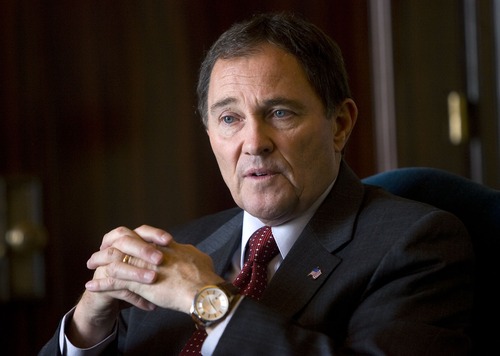This is an archived article that was published on sltrib.com in 2013, and information in the article may be outdated. It is provided only for personal research purposes and may not be reprinted.
Legislators will consider repealing a law passed in the recent legislative session that took a poke at federal land managers' law enforcement authority but has resulted in a lawsuit by the U.S. Justice Department against the state.
Gov. Gary Herbert added the proposed repeal to the issues to be addressed when the Legislature meets in a special session Wednesday, along with a settlement agreement in a 16-year-old land sale dispute and another minor tweak to the authority of a special House committee investigating Utah Attorney General John Swallow.
Herbert issued the initial special session call Friday, with an agenda focused on ensuring that a House investigative committee created to look into alleged malfeasance by Swallow has subpoena authority and the ability to have witnesses testify under oath.
The Legislature also plans to create exemptions to the Utah open-meetings and records laws, allowing the panel to conduct portions of the investigation behind closed doors if a majority of the committee deems it necessary to prevent harm to ongoing criminal investigations.
Herbert added one final change for the House committee: a provision that grants authority to practice law in Utah to any attorney from outside the state hired to work on the Swallow probe.
Repeal of the bill limiting federal law enforcement arose late and was added to the agenda at the request of Rep. Mike Noel, R-Kanab, who sponsored HB155 and now wants it revoked, said Ally Isom, Herbert's deputy chief of staff.
"He apparently, given the controversy, wants to wipe the slate clean and start again working with the stakeholders," Isom said. She said Herbert supports the discussion.
Noel would not comment on his plans for the bill.
"Basically, on advice of counsel, I'm not going to comment," he said, "because we have pending litigation on that bill right now."
HB155 would have made it illegal for Bureau of Land Management rangers and Forest Service protection officers and other Forest Service employees to enforce state laws.
Those employees, if not certified by the state, could be charged with a class B misdemeanor for impersonating a police officer, punishable by a $1,000 fine and six months in jail.
However, before the law took effect, the Justice Department sued the state, and a judge blocked its enactment, arguing that Congress gave the BLM and Forest Service the authority to police federal lands and the state cannot take that away.
On June 28, U.S. District Judge David Nuffer extended the initial restraining order, saying the bill's enactment would do "irreparable harm to the constitutional order."
At the time, Mark Ward, representing the Utah Sheriffs' Association, argued HB155 sought to curtail abuses where federal officers try to enforce state laws. Noel has cited ticketing individuals for not have a fishing license as an example of the types of abuses he sought to stop.
Lawmakers also are expected to pass legislation to settle a lawsuit stemming from a botched 1997 land sale. The State Armory Board bought land in Tooele County from Deep Creek Ranch in exchange for credits for the purchase of $850,000 in state and federal property.
But the federal General Services Administration did not agree to giving the company credit for federal property. The Armory Board argued that voided the contract, but Deep Creek sued, seeking damages from the state and, in 2008, the Utah Supreme Court remanded the case to a trial judge, who ruled in Deep Creek's favor.
Lawmakers are expected to agree to pay Deep Creek about $3 million to resolve the litigation — an amount that reflects some attorney fees, interest and a multiplier that includes any profit Deep Creek could have received for selling the surplus property.
"Technically, we're saying we dispute all the claims but we're willing to pay you [this] amount of dollars to release any claims," said Assistant Attorney General Thom Roberts.



